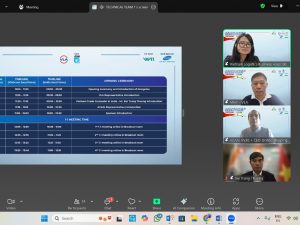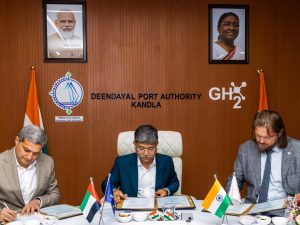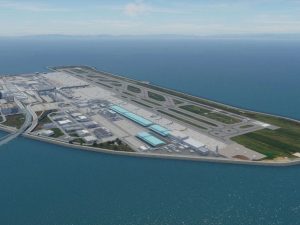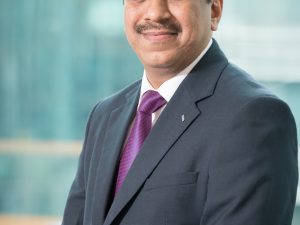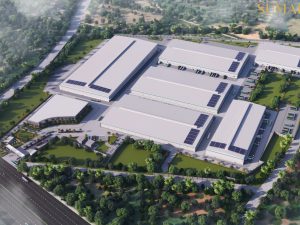Gautham Raju, Senior Manager – Global Air Freight and Head of Air Freight at WIZ said, “We can say that it is not entirely due to knowledge gaps and skill shortages even though we are lacking behind when compared to other sectors. Govt is implementing new policies in place such as NLP and also FTA’s like recently with UK to boost MSME business which will indirectly empower them to implement emerging technologies. The main barrier which we see with MSME’s on adapting to the advanced technologies like AI, IoT and Blockchain is high-cost investment as they might not have sufficient allocations on their annual budget to implement these and maintaining it. Meanwhile the integration of data from the existing systems might be also another challenge which may also end up in data privacy issues. Moreover, they are already comfortable with the process they are currently with, and it might take some time at their level to switch with high end tech savvy apps.
Read More »‘Many players encounter regulatory uncertainty & fear of operational disruptions during tech transition’
Vipin Vohra, Chairman, Continental Carriers said, “There is a clear gap in digital literacy within MSMEs. Limited in-house expertise to evaluate, implement, or manage advanced technologies, coupled with a shortage of industry-specific training programs, constrains their ability to adopt and scale modern digital solutions effectively. MSMEs in logistics and air cargo face hurdles like fragmented digital infrastructure, lack of standardised processes and limited integration across supply chain systems. Many small players also encounter regulatory uncertainty and fear of operational disruptions during technology transitions. Resistance to change among traditional stakeholders further slows adoption. High initial investment costs for AI, IoT, or blockchain—covering infrastructure, software and training—make MSMEs cautious. With tight margins, these companies seek quick returns, but the longer payback period for technology investments often deters decision-making, especially without clear visibility on tangible benefits.
Read More »‘MSMEs fear high upfront investment without immediate ROI’
Amit Maheshwari, Founder and CEO at Softlink Global asserted, “Despite the growing buzz around AI, IoT and blockchain, the logistics sector—especially MSMEs—remains cautious in embracing these technologies. The biggest barrier is not just cost, but perceived cost. MSMEs fear high upfront investment without immediate ROI, often overlooking long-term gains like process efficiency, visibility, or data-driven decision-making. The fragmented nature of the industry and legacy mindset further slow adoption. Many still use disconnected systems for operations, billing, and compliance—leading to revenue leakage and inefficiencies. There’s also a notable knowledge and skill gap. Owners and mid-level managers often lack exposure to emerging tech, and there’s a shortage of trained talent to implement and manage these solutions. As a result, technology is seen as a disruption rather than an enabler. What’s needed is not just affordable, scalable platforms, but also ecosystem-driven handholding—demos, training, and real-world success stories—to make MSMEs confident that embracing technology won’t break their business, but build it.”
Read More »‘PLI scheme, Make in India have incentivized domestic manufacturing & FDI’
Ramanathan Rajamani, CEO, AISATS said, “The China+1 strategy, often interpreted as a diversification effort by global firms, should not be viewed as a shift away from China, but rather as an opportunity for other economies like India to complement global supply chain networks and meet the rising demand more collaboratively. In this evolving landscape, India has emerged as a natural partner due to its strong manufacturing capabilities, robust policy support, and improving logistics infrastructure. India’s large, skilled labour force offers cost-effective solutions across multiple sectors, making it an attractive choice for both existing and emerging supply needs. Policy reforms such as the Production-Linked Incentive (PLI) scheme and the Make in India initiative have further incentivized domestic manufacturing and foreign investment, particularly in areas of electronics, pharmaceuticals, and textiles. Geographically, India enjoys a strategic location with proximity to key Asian, African, and European markets, enabling smoother access to global trade routes. Its continued focus on infrastructure development, such as dedicated freight corridors, multimodal logistics parks, and port modernization, positions India as a reliable and resilient supply chain node. India’s participation in the “+1” strategy signals a shared role in building a more agile and diversified global supply chain, capable of absorbing shocks and responding to shifting geopolitical and economic priorities.”
Read More »VLA, ACAAI join hands to boost India-Vietnam EXIM trade
Ahead of FIATA World Congress, set to be held from October 6 to 10, 2025, in Hanoi, Vietnam Logistics Business Association (VLA) conducted virtual session of B2B ‘Matching Online Towards’ FIATA World Congress 2025 Initiative, with the purpose of connecting businesses and creating new opportunities for VLA members and international partners. The Air Cargo Agents Association of India (ACAAI) was invited to collaborate and discuss opportunities for connection, cooperation and business expansion for members of both sides, contributing to promoting trade between Vietnam and India in the coming time. Nguyen Duy Minh, Vice President of VLA said, “India is currently one of Vietnam’s top strategic economic partners. Bilateral trade between Vietnam and India has grown significantly in recent years, reaching over USD 15 billion in 2022, and is expected to further expand with the goal of hitting USD 20 billion in the near future. India is a key market in sectors such as pharmaceuticals, agricultural products, textiles, chemicals, and especially logistics and supply chain services. At the same time, Vietnam is becoming an increasingly important manufacturing and investment destination for Indian enterprises. There is a growing interest from Indian companies to enhance their footprint in Vietnam, particularly in logistics infrastructure, port development, and cold chain logistics.” Dinesh Krishnan, Chairman, ACAAI Southern Region also said, “India and Vietnam have longstanding trade and economic relations which have steadily grown over a period of time. From a meagre US$200 million in the year 2000, bilateral trade grew to April 2024 – March 2025 reached US$ 15.76 billion, registering an increase of 6.40 percent year on year. In FY 2024-2025, Vietnam is India’s 20th largest trading partner and 15th largest export destination globally. India …
Read More »DP World inks pact to boost rail freight technology
DP World, the Deendayal Port Authority (DPA), and Nevomo have signed MoU to explore potential opportunities for cooperation in the development and implementation of a pilot project using Nevomo’s MagRail proprietary technology for the self-propelled movement of rail-based cargo and freight within the existing port ecosystems. DP World is leading efforts to introduce advanced freight technology aimed at transforming cargo movement in India. Deendayal Port Authority (DPA), a key multi-cargo port under the Government of India, is facilitating exploration of this technology at its terminal in Kandla to evaluate the feasibility of this futuristic freight transportation system. The initiative marks a significant step toward building faster, more efficient, and sustainable port-hinterland connectivity. This initiative is aligned with India’s National Logistics Policy and PM Gati Shakti agenda aimed at modernizing and integrating the country’s logistics infrastructure. The MoU was signed by Shri Sushil Kumar Singh, IRSME, Chairman of Deendayal Port Authority (DPA), Rizwan Soomar, CEO & Managing Director, Middle East, North Africa, India Subcontinent, DP World, and Przemek (Ben) Paczek CEO Nevomo Group BV along with other senior dignitaries in Kandla, Gujarat, on 15th July 2025. The MoU sets the framework for a 750-metre pilot project of MagRail technology at Deendayal Port. A first-of-its-kind initiative in India will demonstrate self-propelled freight movement within a live port environment. It aims to develop and implement MagRail-based solutions that enable autonomous, electric-powered wagons using linear motor technology on existing rail tracks, enhancing capacity, efficiency, and speed for containerized and bulk cargo while reducing costs and CO2 emissions, making the logistics systems greener, faster, and more interoperable.
Read More »‘GHIAL plans to expand capacity at terminal 1 and 2 by FY26’
Informing about GMR Hyderabad Airport’s expansion plans, Pradeep Panicker, CEO, GHIAL said, “The current cargo infrastructure at Hyderabad is undergoing significant expansion to meet growing demand. The Existing Cargo terminal-1 can handle 1,50,000 MT per year. It is being upgraded to double the existing capacity and, upon completion, will feature a state-of-the-art Domestic Terminal, an International Courier/Express Terminal, and a dedicated Export Perishables Terminal, all aimed at enhancing operational efficiency and customer satisfaction. Additionally, construction of the new Cargo Terminal 2 is in progress, substantially increasing overall handling capacity to 350,000 MT by end of FY26.”
Read More »Maharashtra to build India’s first offshore Airport in 2026
Maharashtra is all set to build India’s first offshore Airport and Mumbai’s third Airport near the upcoming Vadhavan Port. The construction work will begin in 2026 said, Chief Minister Devendra Fadnavis. “Maharashtra plans to build India’s first offshore airport near Vadhavan Port, an innovative solution to Mumbai’s chronic airport congestion, inspired by Japan’s Kansai International Airport, completed in 1994 on a man-made island after overcoming major engineering challenges,” said reports.
Read More »‘India’s scale, policy support & investment benefitting the sector’
Global companies are diversifying their manufacturing and sourcing bases across Asia due to the ever-evolving geo-political developments,” said, Huned Gandhi, Managing Director, Air & Sea Logistics at Dachser India. He added, “As a result, several countries including Vietnam, Thailand, Indonesia and India are being integrated more deeply into the global value chains. Each location offers distinct advantages, whether in terms of cost, infrastructure, trade agreements, or workforce capabilities. India is steadily positioning itself as a reliable long-term partner, especially in sectors such as automotive, pharmaceuticals, textile and garments and also electronics. While Southeast Asia has seen early traction due to proximity and existing trade ties, India’s scale, policy support and investment in logistics infrastructure are creating long-term advantages. This broader regional diversification is fostering a more resilient and multi-modal supply chain landscape across Asia.”
Read More »DPIIT selects Thiruvananthapuram & Kochi to improve logistics ops
Thiruvananthapuram and Kochi have been selected by the Department for Promotion of Industry and Internal Trade (DPIIT) from over 50 tier-2 and tier-3 cities across the country for the preparation of city logistics plans to reduce logistics costs, congestion and improve connectivity. “The State government has now proposed the Directorate of Urban Affairs as the nodal agency for coordinating activities related to the city logistics plans,” said reports. The city logistics plans are expected to be a comprehensive framework designed to optimise urban goods movement, reduce costs and minimise environmental impact. It will be a strategic plan designed to adequately address the urban freight and logistics needs of the city’s population and businesses to achieve economic growth with better quality of life and environment. The logistics plan will be prepared in a structure and format that can be easily integrated with the Comprehensive Mobility Plan (CMP) of the city. One of the focus areas will be in reducing urban emissions by optimising vehicle movement within cities through strategic routing and consolidation of freight. The plan will also prioritise efficiency by optimising goods movement, added reports.
Read More » Cargo Breaking News
Cargo Breaking News




